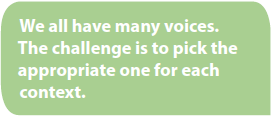 Selecting appropriate tone and style ensures basic professionalism. This means that your writing is thoughtful, respectful and formal enough for the context.
Selecting appropriate tone and style ensures basic professionalism. This means that your writing is thoughtful, respectful and formal enough for the context.
It also means understanding the specific expectations of the writing you are doing. For example, a chemistry lab report will require a different tone and style than a history essay, and an engineering report will require different emphasis or description than a marketing report. All of these contexts require a unique tone and style, different from how you might express yourself on social media.
As a student, you are expected to become familiar with the expectations for writing style, format and special vocabulary associated with your course or area of study.
In this workout, you will practice three strategies for improving the appropriateness of your writing:
- Use appropriate formal language
- Use appropriate complexity of language
- Avoid clichés and slang
Let’s get started.
Use appropriate formal language
Example:
 |
In this essay, I want to say that people should not hate on social media just because some kids use it to be jerks and bullies. |
 |
This essay argues that the benefits of social media should not be ignored just because it can be used to do harm. |
Problem:
When the formality and style of language does not suit the more formal context of academic writing, the reader struggles to take the ideas seriously. These sentences say the same thing, but only the second one is suitable for academic writing.
Fix the Problem:
Select the most suitable language for the context. You may find it challenging to adopt a more academic style, especially when you first start your studies. With more reading and practice, it will start to feel natural.
Use appropriate complexity of language
Example:
 |
I want to talk about how Facebook and things like that could be bad for us but we use them anyway because it’s fun. |
 |
This essay will argue that while social media like Facebook negatively affects how we interact with others, we continue to embrace it as a source of entertainment. |
Problem:
When a writer relies on very simple language or vocabulary, it can seem that the writer does not have anything interesting or complex to communicate. We often see writing like this when the student has not worked hard to develop more complex ideas.
Fix the Problem:
The challenge is to push deeper at our initial ideas and develop them with a complexity of thought and language suitable for academic contexts.
Avoid clichés and slang
Example:
 |
At the end of the day, we are between a rock and hard place when it comes to social media. Its popularity is awesome but we will have to crack down on the risks of using it. |
 |
We face a dilemma when it comes to social media. Its popularity is undeniable, but we must address the risks of using it. |
Problem:
When we write we want to impress, and for students this often means trying to express ideas in fancy ways. However, clear and direct writing is always more impressive because it reveals rather than obscures the message of the writing.
In this case the student’s use of cliché and slang detracts from the ideas.
Fix the Problem:
The challenge is to find a professional vocabulary for sounding intelligent. Aim to substitute cliché and slang for university-level vocabulary.

